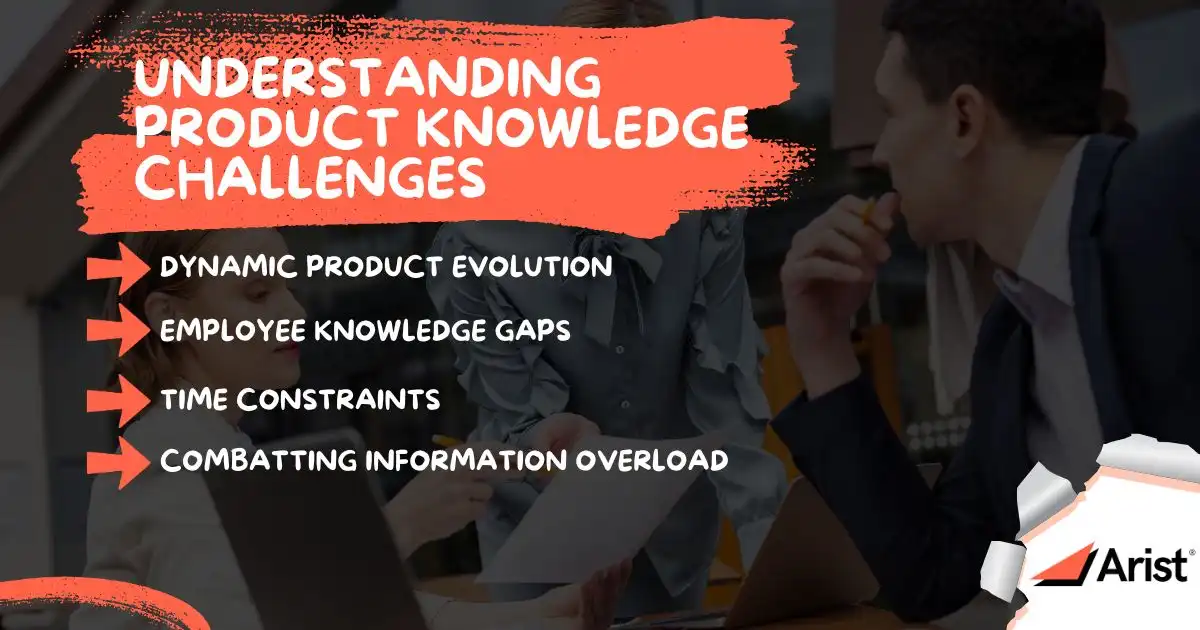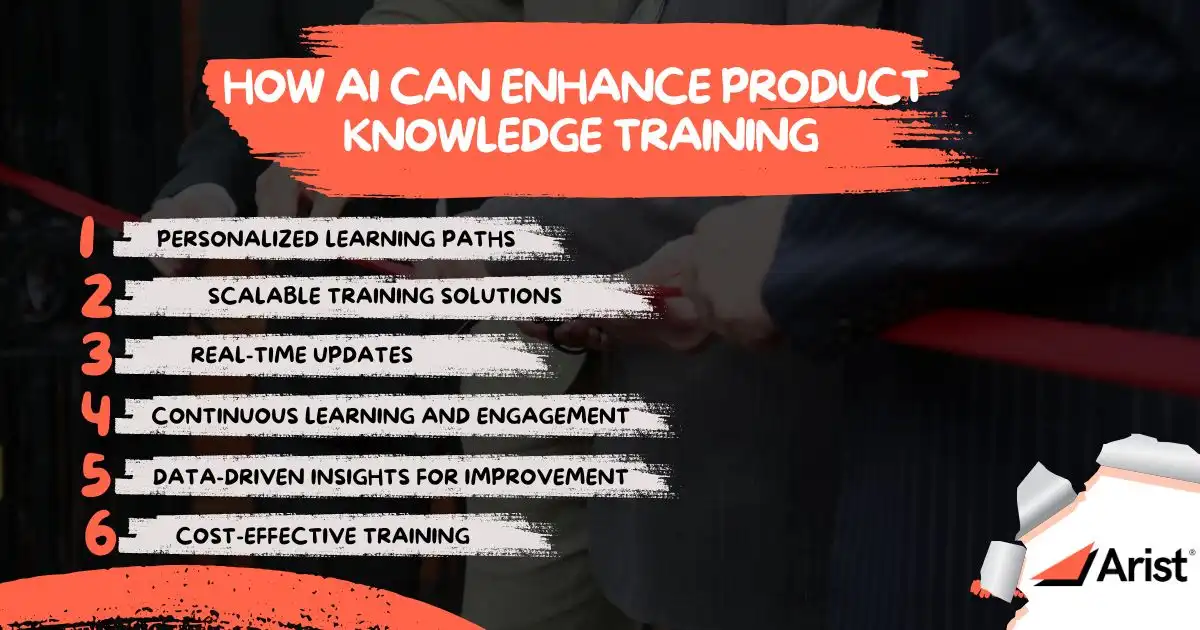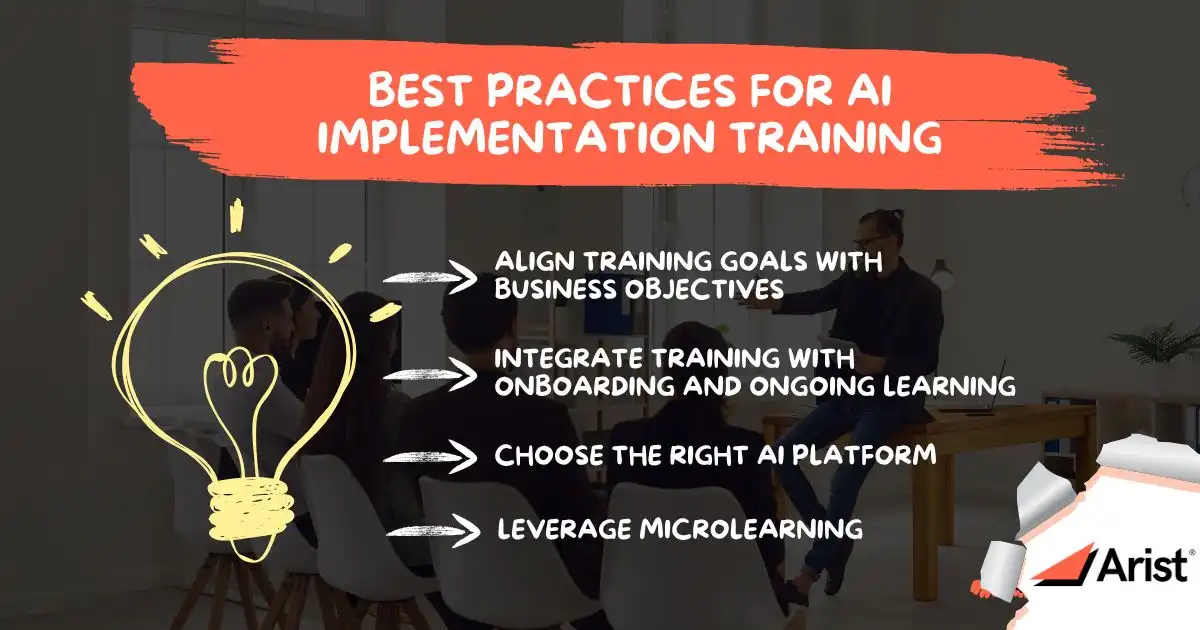How To Improve Product Knowledge With AI Training
How can companies ensure their employees stay informed with constant product updates and growing demands?
Staying ahead in a dynamic and competitive market requires more than great products; it also demands teams with a deep understanding of what they offer. Companies and businesses should maximize innovative solutions that transform how we learn and adapt. Utilizing a game-changing approach designed to empower companies and HR leaders to bridge knowledge gaps and boost team performance is a strategic approach every forward-thinking leader uses.
Understanding Product Knowledge Challenges

Dynamic Product Evolution
As the world advances, products don’t stay the same for long. From software updates to feature rollouts and entirely new product launches, the pace of change is unprecedented. This evolution creates a significant challenge: traditional training methods often cannot keep up. Static training materials or infrequent sessions quickly become outdated, leaving employees with obsolete knowledge that no longer applies.
For example, a sales team may still pitch an older product version because they haven’t received timely updates on its newest features. This disconnect can lead to missed opportunities, customer frustration, and a lack of confidence among employees who feel unprepared to answer questions or showcase the latest capabilities. The faster products evolve, the more adaptable and immediate training is needed.
Employee Knowledge Gaps
Every team consists of individuals with varying expertise, experience, and job roles. A product manager may understand a product’s technical specifications in depth, while a customer service representative might only need to know how it addresses specific user pain points.
These differences can lead to knowledge gaps, where some employees are highly informed while others struggle to keep up. When teams don’t have a uniform level of understanding about the product, it results in inconsistent communication with customers, missed cross-functional opportunities, and inefficiencies in collaboration. A one-size-fits-all approach to training exacerbates this problem by failing to cater to individual learning needs or role-specific priorities.
Time Constraints
The modern workplace is busier than ever. Employees often balance multiple responsibilities, meet tight deadlines, and navigate high-pressure environments. In such a setting, dedicating hours to lengthy training sessions feels impossible and counterproductive.
When training programs demand too much time, they’re often met with resistance or skipped altogether, leaving employees without the knowledge they need to excel. This creates a cycle where training is seen as a burden rather than a benefit. Moreover, employees who don’t receive quick and digestible learning resources may resort to unreliable sources or guesswork, further compounding the problem.
Combatting Information Overload
Flooding employees with too much information at once can be as harmful as providing too little. Overwhelming presentations or dense manuals often leave critical details lost in the noise, resulting in poor retention and ineffective application. Employees need targeted, digestible content delivered in manageable doses. When training is focused and prioritized, teams can confidently absorb the most relevant knowledge without feeling overwhelmed.
How AI Can Enhance Product Knowledge Training

Personalized Learning Paths
One of the biggest challenges in traditional training is catering to employees' diverse learning needs. AI addresses this by personalizing the learning experience. It can analyze an individual’s progress and learning patterns and adapt the content accordingly. This approach ensures that no employee is left behind and that each team member gets the exact level of training they need to succeed.
This level of customization helps employees learn faster. It boosts engagement by offering content in a format that suits their learning style — whether through interactive modules, quizzes, video tutorials, or written content. Personalized learning also helps with retention, as the training feels more relevant and easier to absorb.
Scalable Training Solutions
Traditional product knowledge training often requires significant resources and can be expensive and time-consuming, particularly for organizations with large, distributed teams. With AI-driven platforms, training can be deployed to unlimited employees across various locations simultaneously without compromising quality.
AI consistency: Every employee, whether in a local office or a remote location, receives the same level of training. This identifies trends or gaps in knowledge, allowing businesses to adjust training programs as needed without overhauling the entire system. This flexibility and scalability make AI an efficient and cost-effective solution for businesses of all sizes. It can continuously monitor employee progress, providing real-time individual or team performance insights.
Real-Time Updates
When a product update occurs, AI systems can instantly reflect the change in training content, ensuring that your team can access the most up-to-date information. This is particularly important for businesses operating in fast-moving industries, where staying current is key to maintaining a competitive edge.
AI can also track product usage patterns, providing insights into which features employees interact with most frequently and which are still underutilized. With this data, training can be adjusted to focus on the essential features for the team’s success and customer satisfaction.
Continuous Learning and Engagement
In today’s rapidly changing world, product knowledge isn’t something you learn once and then forget about. It’s an ongoing process that requires continuous updates and engagement. With AI, training isn’t limited to long, formal sessions. Microlearning is incorporated into employees’ routines — short, digestible learning modules that can be accessed as needed, right from their phones or desktops. These bite-sized lessons are perfect for reinforcing key concepts and providing instant answers to questions that may come up during the workday.
Engaged training, such as gamification, interactive quizzes, and scenario-based simulations, makes the learning process more effective and enjoyable. Engagement boosts retention, meaning employees are more likely to remember and apply important product details on the job.
Data-Driven Insights for Improvement
AI platforms can gather and analyze vast amounts of data, offering previously complex insights to capture with traditional training methods. It can track how well each employee is progressing, where they are struggling, and which areas of the product they need more support with.
This data-driven approach allows HR and management teams to make informed decisions about training programs. They can identify common knowledge gaps across teams or departments and adjust the training content accordingly. AI can also provide feedback on which aspects of the training are most effective, allowing for continuous improvement.
These insights are valuable not only for immediate training needs but also for long-term strategy. By continuously gathering data, companies can better predict future training requirements and proactively address potential knowledge gaps before they impact performance.
Cost-Effective Training
Training programs, especially large-scale ones, can be expensive to develop and maintain. Traditional methods often require significant resources like instructors, travel costs, or printed materials. AI, on the other hand, offers a more cost-effective solution. Once the system is in place, there’s little need for ongoing investment in new materials or instructors. AI platforms can scale with the business, meaning the cost per employee decreases as the company grows.
The ability to automatically update content and track progress reduces the need for costly updates or re-training sessions. Thus, companies can easily invest in employee development without breaking the bank.
Best Practices for AI Implementation Training

Align Training Goals with Business Objectives
Ensure the training goals align directly with your company’s broader business objectives. This means that training should be treated as a general, one-size-fits-all activity. Instead, it should focus on product knowledge areas that have a measurable impact on performance. Consider your company’s biggest priorities, whether they involve enhancing customer experience, boosting sales, improving internal processes, or staying ahead of competitors.
By aligning training with key business goals, you ensure that your AI-powered training program isn’t just something nice; it becomes a strategic asset that directly contributes to business success. With the right AI tools, you can measure how healthy employees master product knowledge that directly impacts their sales targets or customer satisfaction scores. This ensures that training isn’t just an expense but an investment in your company’s growth.
Integrate Training with Onboarding and Ongoing Learning
Product knowledge training shouldn’t be seen as a one-time event that occurs during onboarding and then fades away. Product features and updates are constantly changing, so training must be ongoing.
AI allows you to seamlessly integrate training into your company’s broader learning ecosystem, ensuring that product knowledge training becomes part of both onboarding and continuous professional development. For new hires, it can provide them with a tailored training path that ensures they get the essential product knowledge they need to hit the ground running. But onboarding is just the beginning. It can automatically update training materials whenever there are changes to a product. This eliminates the need for lengthy retraining sessions every time something changes, as employees can learn in small, digestible bites.
Integration is the key to successful long-term training. AI doesn’t just help your team stay informed; it promotes a culture of continuous learning. Employees no longer have to rely on outdated manuals or wait for a scheduled training session—they can access up-to-date product knowledge on demand, right when needed. This keeps employees engaged and helps them retain information better, which is especially crucial for complex products or systems.
Choose the Right AI Platform
Choosing the right platform is crucial for ensuring that your investment pays off. Not all AI platforms are created equal, and the wrong choice could hinder your training efforts instead of enhancing them.
Scalability. As your company grows, your training needs will evolve. Choose a platform that can scale with your organization, whether that means adding more users, more advanced features, or integrating new product lines. A flexible, scalable platform ensures that the system will meet your needs now and in the future.
User-friendliness. The success of an AI training program depends not only on the technology behind it but also on how easy it is for your employees to use. An intuitive and straightforward platform will ensure better adoption rates, meaning employees are more likely to engage with the training regularly. Ideally, the system should require minimal setup, and employees should be able to jump right in without much technical training or support.
Compatibility with your existing systems. If your company already uses an HR software platform or a Learning Management System (LMS), you’ll want to choose an AI system that integrates smoothly with it. This reduces friction and ensures that training data flows seamlessly across your company’s technology ecosystem. Compatibility with existing systems also makes implementation faster and easier, helping to minimize disruptions.
Leverage Microlearning
In today’s work environments, employees are constantly balancing multiple responsibilities. Long, drawn-out training sessions are often impractical and, in many cases, ineffective. That’s why microlearning has become essential to modern AI training programs.
Deliver training in short, focused segments that employees can engage with on their own time. Rather than asking your team to sit through an hour-long training session, AI platforms can break down product knowledge into digestible chunks—whether that’s through short videos, interactive quizzes, or brief articles. Employees can engage with these mini-lessons during their breaks, between meetings, or whenever they have a few free minutes, making learning feel more manageable and less disruptive.
AI can also track progress over time, delivering relevant content based on an employee’s performance and feedback. This adaptive learning ensures that microlearning is personalized and focused on the areas that matter most to each individual. Over time, this can add up to significant improvements in product knowledge and overall employee performance.
Elevate Your Training: Unlock New Potential In Your Workforce
Practical product knowledge training drives growth, boosts employee confidence, and enhances performance. By maximizing leveraging AI-powered tools emphasizing personalization, real-time updates, and continuous learning, companies can ensure their teams stay informed, agile, and ready to outperform the competition.
Arist delivers personalized, scalable training directly to your sales reps through the platforms they already use: SMS, Slack, Microsoft Teams, and WhatsApp. Whether reinforcing product knowledge, coaching through complex deals, or onboarding new hires faster, Arist seamlessly upskills your salesforce without disrupting productivity.
Tailored learning paths – AI pinpoints rep strengths and weaknesses, delivering micro-courses that focus on areas that drive results.
Real-time insights – Track performance and adapt training based on live sales interactions and feedback.
Scale without limits – Upskill teams across regions, time zones, and roles with consistent, high-impact training.
If you're ready to transform how your team learns and stays current, book a demo with Arist today to see how you can elevate your product knowledge process.
Arist Team
Bring
real impact
to your people
We care about solving meaningful problems and being thought partners first and foremost. Arist is used and loved by the Fortune 500 — and we'd love to support your goals.
Curious to get a demo or free trial? We'd love to chat:


